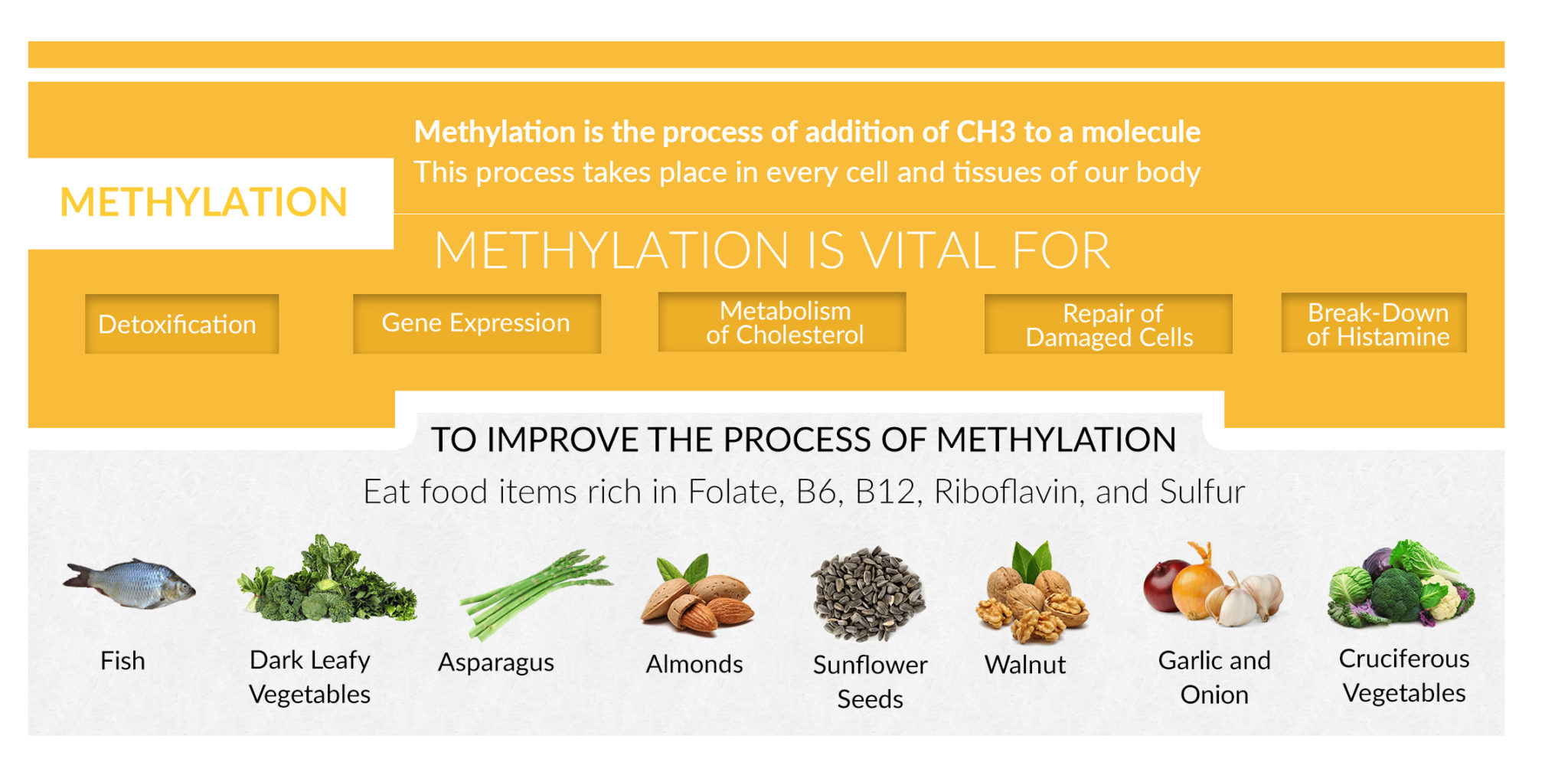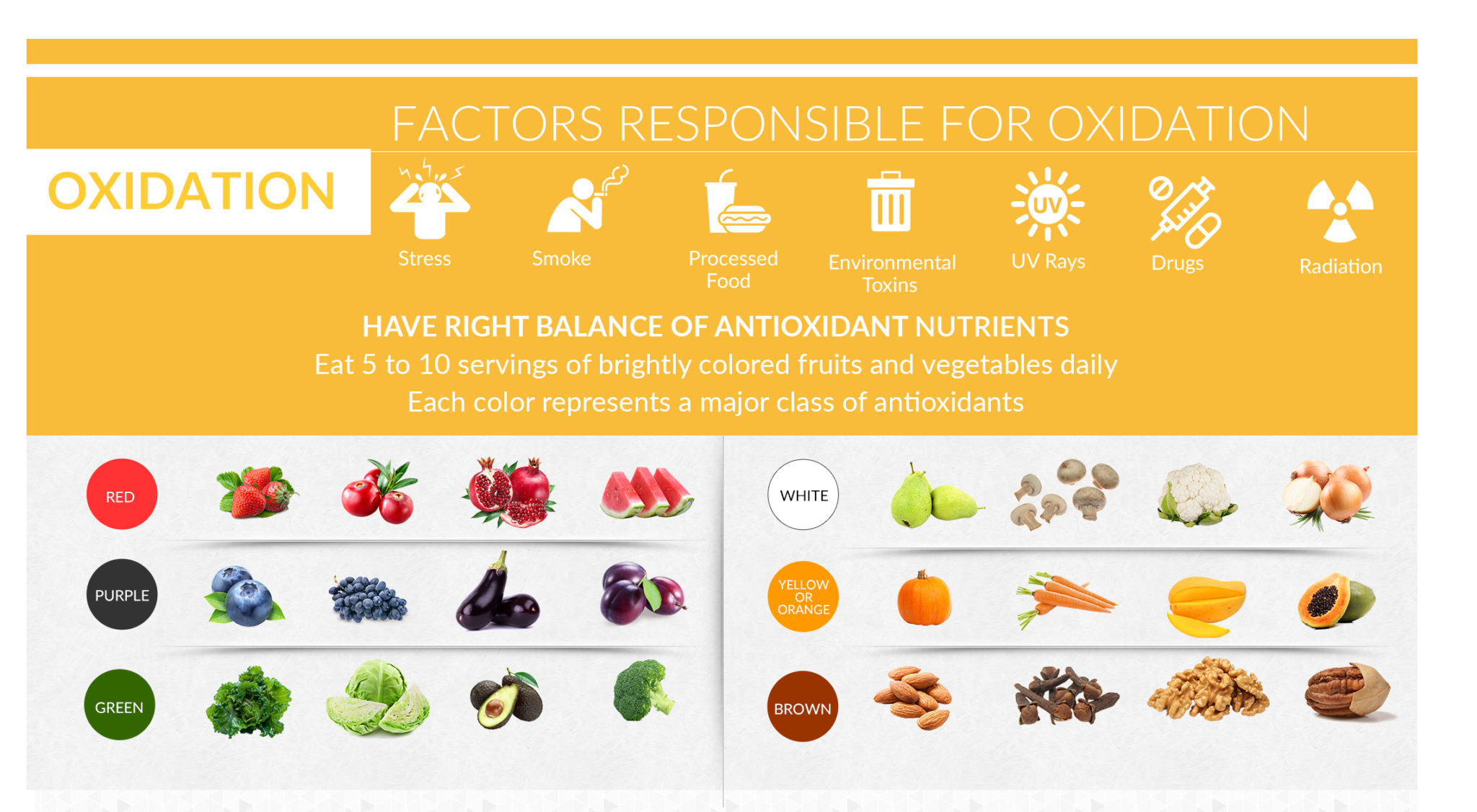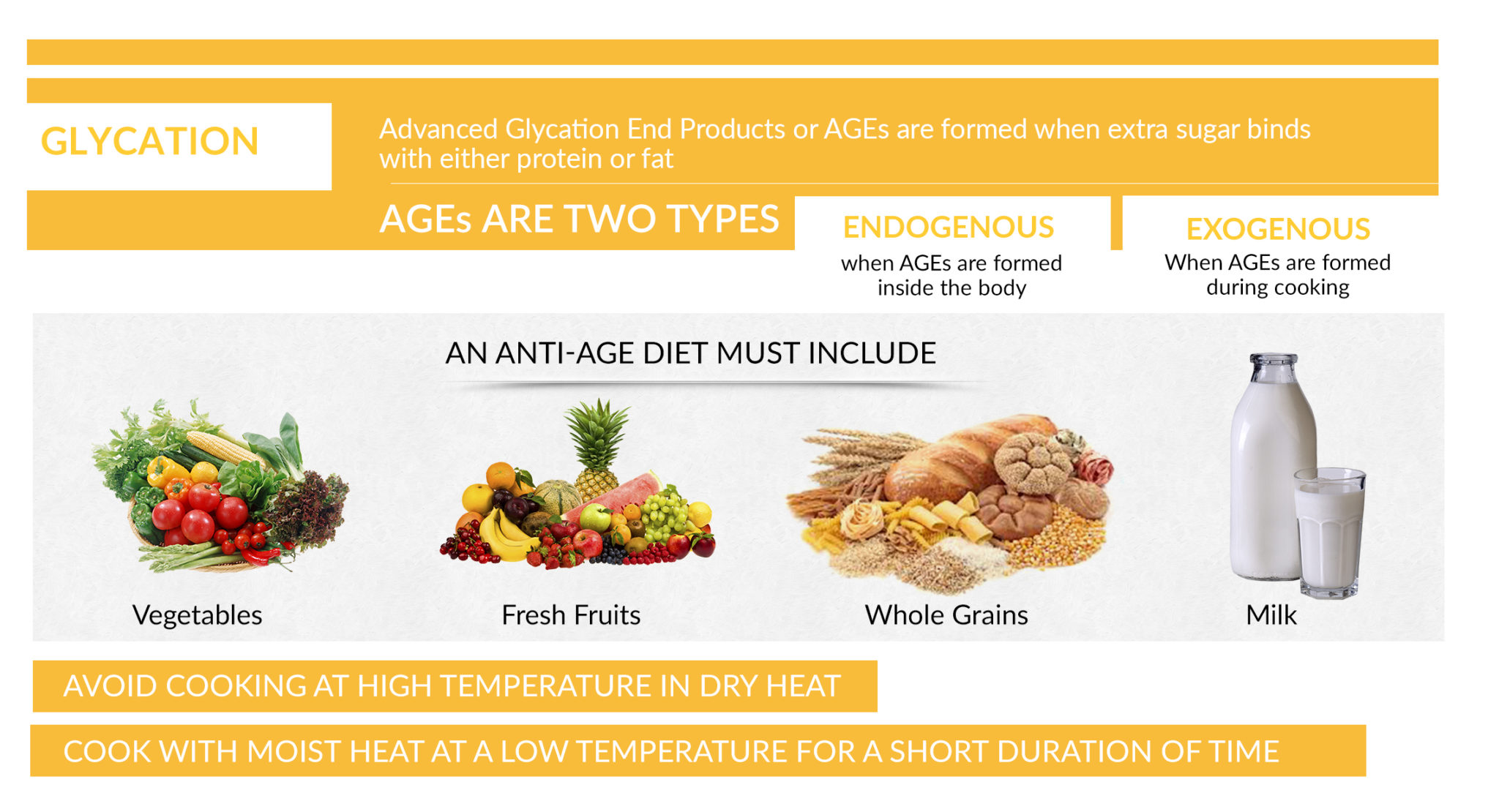Chronological Age Vs Biological Age
Our age is just a number. It is not an accurate marker of our health. Our biological age is a better indicator of health and vigor. Different people age at a different rate. Our biological age is dependent on our genes, lifestyle, diet, stress, and environment surrounding us. Some people may be chronologically 33 years old but biologically they are as old as a 45 years old person. For others, even at 80 years, they may carry the body of a 60 years old. Our biological age is influenced by many body processes. There are 4 body processes that accelerate aging when out of balance namely oxidation, inflammation, glycation, and methylation. It is important to keep these biological processes in balance for youth and longevity.
1. Oxidation
Oxidation is what you see when a cut apple turns brown or when an iron rod rusts. Within our bodies oxidation takes place at the cellular level and free radicals are natural by-products of biochemical reactions involved in metabolism and immune system responses. When this cellular oxidation goes out of balance, untimely wear and tear of the cells take place leading to a buildup of oxidative stress and inflammation. In our body, we have antioxidants or molecules that prevent the damaging effect of free radicals by donating an electron to them. Oxidative stress occurs when more free radicals are produced overwhelming the capacity of the antioxidants to neutralize them.
Biochemistry of Oxidation
Free radical is an oxygen-containing molecule that has one or more unpaired electron in its outer orbits. These unpaired electrons make the molecule highly reactive as they want to gain an electron from other ions and molecule to complete the pairing. They react with protein, lipids, and DNA. By reacting with proteins, they can change the structure and functions of the enzymes. They react fiercely with lipids of the cell membrane setting in motion a chain reaction of free radical formation that spreads from one part of the cell to the other destroying the entire cell membrane. Free radicals also target the single strand and double strand of the DNA causing its break-up and crosslinking leading to mutation, carcinogenesis, and aging. Oxidative stress is responsible for many chronic conditions such as cancer, cardiovascular diseases, Alzheimer’s and premature aging.
How to combat the effect of oxidation
More free radicals are formed because of a faulty diet rich in fried food, consumption of alcohol and tobacco, air pollutants and high use of pesticides on crops.
The key to regaining oxidation and free radical balance in the body is to eat food rich in Vitamin A, C & E, and flavonoids. We need to achieve a right balance of antioxidant nutrients by eating 5 to 10 servings of brightly colored fruits and vegetables throughout the day. Each color represents a major class of antioxidants and it is better to have a representative of each color group in the diet- red tomatoes, orange carrots, blueberries, purple grapes, green apples, green broccoli, brown beans, and walnuts.
2. Inflammation
Like oxidation, inflammation is an integral part of our body’s immune response system. It is our natural repair mechanism that protects our tissues from outside pathogens like bacteria and viruses. When we get injured or suffer from an infection, the biochemical processes release proteins called cytokines that activates body’s immune cells, hormones and nutrients to fix the problem. Redness, swelling, warmth, pain, some form of inflexibility and immobility that we experience during a trauma are the symptoms of this ongoing repair work.
An optimal balance of inflammation is critical for health.
However, when this balance is disrupted, the inflammation persists even when there is no threat of a foreign invader. That is when inflammation becomes bad for health and causes many debilitating conditions in the body. For example, an overactive inflammatory response can stimulate bone breakdown leading to osteoporosis, interfere with cartilage repair worsening arthritis or accelerate muscle breakdown leading to flare-ups and conditions such as fibromyalgia. Many major diseases that plague us such as cancer, heart disease, arthritis, depression and Alzheimer’s are linked to chronic inflammation.
Not every inflammation is bad
Inflammation is of two types – acute and chronic. Acute inflammation arises after a cut, sore throat, sprained ankle, viral or bacterial infection. It is a short-term, necessary function of the body. In this healthy avatar, it creates a protective wall of defense and subsides after the repair and healing work is over.
Chronic inflammation occurs when the immune response to an injury refuses to recede even after the completion of the repair. In chronic inflammation, the healing process is suppressed and the tissue dysfunction is accelerated. It is long-term in nature and occurs because of faulty lifestyle and environmental factors such as excess weight, poor diet, lack of exercises, stress, smoking, exposure to pollutants, and excessive alcohol consumption. Chronic inflammation is damaging because it acts like a slow-burning fire, continuing to stimulate pro-inflammatory immune cells that attack healthy areas of your body.
How to combat inflammation
Management of chronic inflammation requires a multi-pronged holistic approach consisting of healthy diet, exercises, detoxification of the body, and abstinence from drinking and smoking. There are many natural herbs and spices that are known for their anti-inflammatory properties like turmeric, guggul, ginger, basil, neem, aloe vera, licorice, and Boswellia.
3. Glycation
Sugar is the main currency of energy in the body. Our body converts the carbohydrates into glucose that is used by the body to fuel its activities. But the presence of the excess of sugar in the body can cause serious health conditions such as hyperinsulinemia, insulin resistance, high blood sugar and type 2 diabetes. The excess sugar in the blood binds abnormally (in absence of the controlling action of an enzyme) with protein or fat producing harmful molecules called Advanced Glycation End Products or AGEs in short.
Endogenous and Exogenous glycation
The process of binding of sugar with protein or lipid molecule in the absence of controlling enzyme in the body is called endogenous glycation. This process can also occur outside our body in the process of cooking and is called exogenous glycation. Dietary or exogenous AGEs stem from cooking foods at high temperatures. These AGEs contribute to increases oxidative stress and inflammation. Animal-derived foods high in protein and fat contain not only more AGEs but also contribute to additional AGEs formation during the cooking process. The more AGEs (endogenous and exogenous) we have in our body, the more we age. The complications associated with diabetes such as retinopathy, nerve pain and atherosclerosis increase with the increase in the concentration of AGEs. It is said that diabetics age faster than others.
Glycation and loss of collagen
Glycation is also associated with the loss of collagen when the extra sugar in your body attaches to the collagen creating AGEs. These AGEs degrade collagen and elastin, causing them to harden and loosen elasticity. When it happens in the arteries it can cause heart attacks and strokes. With more AGEs in your system, you can also lose the plumpness of your skin causing premature aging of the skin.
The build-up of AGEs can be controlled by healthy diet and lifestyle. Avoid animal-derived high fat and protein food items as they contain more AGEs. Include vegetables, fruits, whole grains and milk that contain relatively few AGEs, even after cooking. You can also prevent the AGE formation during cooking by cooking with moist heat for a shorter duration of time at lower temperatures and by use of acidic ingredients such as lemon juice or vinegar.
4. Methylation
Methylation is a vital biochemical reaction that takes place in every cell and tissues in your body. Life would not happen without the process of methylation. It plays an important role in gene expression. In methylation process, the methyl group CH3 is added to a molecule. The addition of methyl group to a protein changes how that protein functions and behaves. Since all enzymes, hormones and even genes are made of proteins methylation affects the working of all parts of your body. Lack of proper methylation can cause heart attack, stroke, dementia, depression, migraine, autism, attention deficit disorder, infertility, and cancer.
Methylation and detoxification
Methylation helps in detoxification of toxins and heavy metals from the body by converting toxic amino acid or homocysteine into a beneficial amino acid or methionine. If your body cannot methylate properly, toxins build up in your bloodstream and you would have the higher susceptibility to heavy metal toxicity and toxicity from other sources such as pesticides and pollutants. MTHFR (methylenetetrahydrofolate reductase) is a key enzyme that is instrumental in the detoxification process. If this enzyme is impaired, this detoxification reaction is impaired, leading to high homocysteine blood levels.
Other functions of Methylation
Methylation also influences the histamine breakdown in the gut. It regulates the metabolism of cholesterol and lack of methylation may cause of buildup of cholesterol in the arteries. The process of methylation regulates the expression of genes by turning on or off certain genes by the process of DNA methylation. Methylation also controls the production and recycling of glutathione — the body’s master antioxidant that helps in repair of cells damaged by free radicals reduces inflammation and assists other antioxidants like Vitamin A, C, and E.

How to improve the process of methylation?
To improve the process of methylation eat food items that are rich in folate, B6, B12, and riboflavin. Sources of B vitamins include fish, dark leafy greens, asparagus, almonds, sunflower seeds and walnuts. These food items are essentially methyl donors and help in the process of methylation. You can also supplement your diet with magnesium, zinc, and probiotics. Include food rich in sulfur such as garlic, onions and cruciferous vegetables like kale, broccoli, cauliflower, cabbage, and watercress. At the same time reduce stress, drinking, smoking, and exposure to toxins. Take antioxidants, sleep well and exercise as these factors help in optimizing the process of detoxification. Certain herbs and spices such as milk thistle and curcumin also support the process of methylation.
Sure we all have to age and die one day but until that time we should take every action that helps us to live to the fullest. Keeping in balance these 4 body processes that accelerate aging shall ensure a healthy and fulfilling life.




Excellent information, I received it very late. All should get this information. It should get more viewers. It should be put in all d public places, hospitals, schools, colleges. It should be added in d study text books for all d students tonnes of thanks